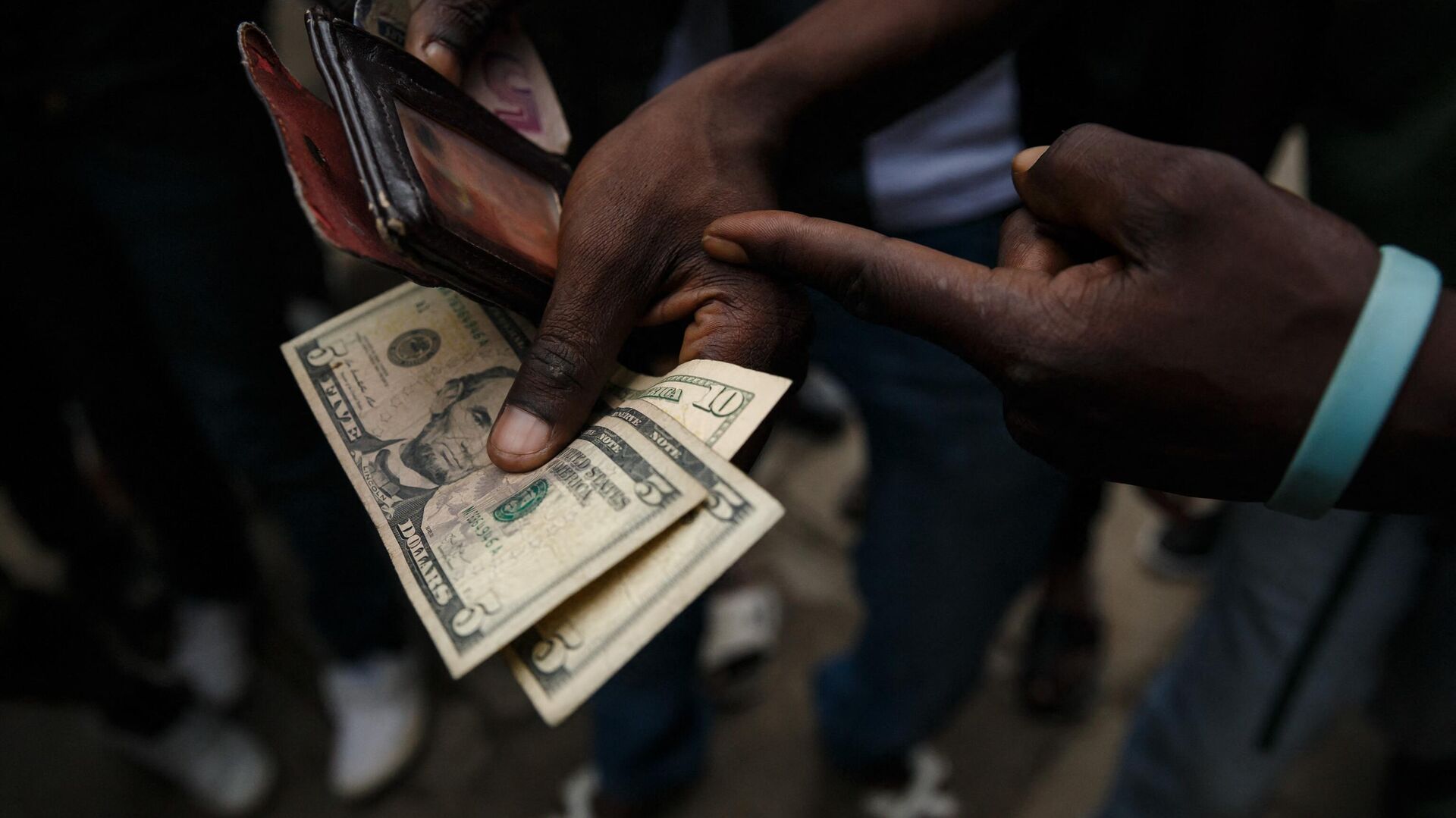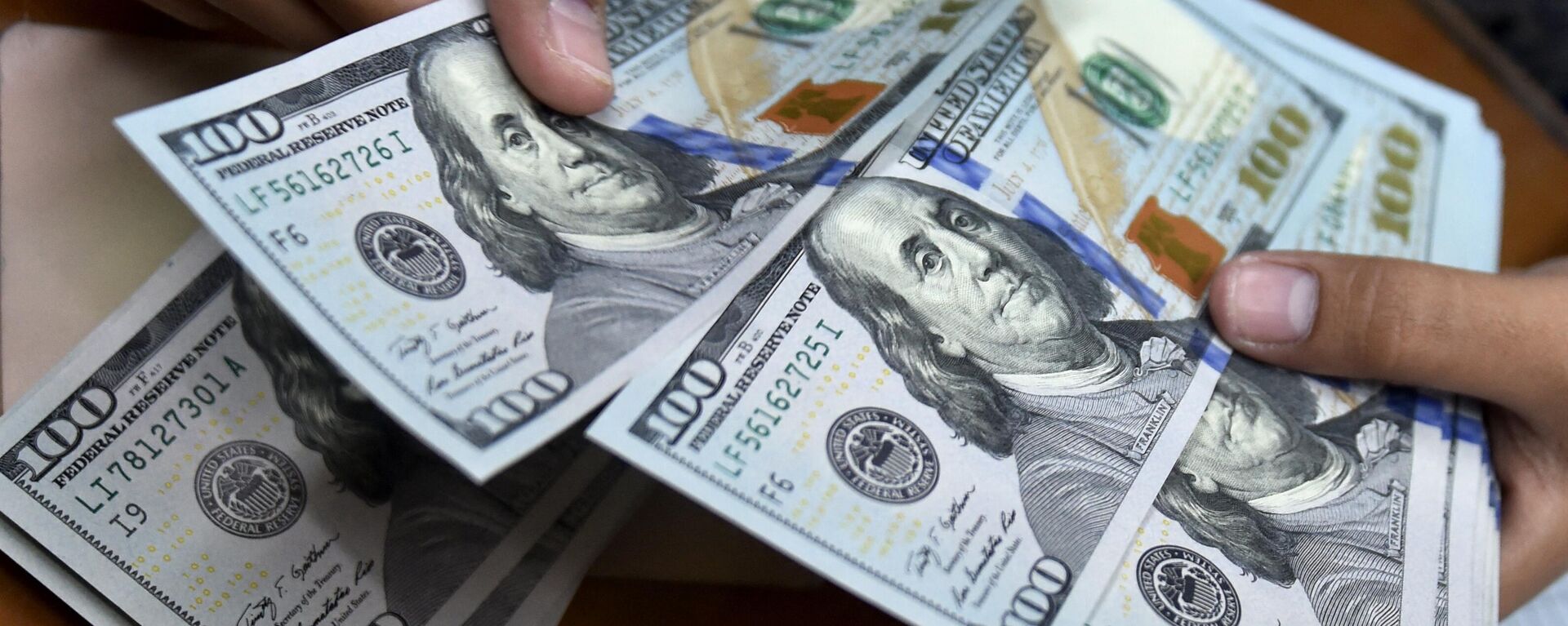https://en.sputniknews.africa/20230918/east-african-businesses-hit-by-dollar-scarcity-regional-business-council-says-1062196327.html
East African Businesses Hit by Dollar Scarcity, Regional Business Council Says
East African Businesses Hit by Dollar Scarcity, Regional Business Council Says
Sputnik Africa
The use of local currency instead of the US dollar has emerged as a global trend, embraced by a number of African countries. According to the UN Economic... 18.09.2023, Sputnik Africa
2023-09-18T19:30+0200
2023-09-18T19:30+0200
2023-09-18T19:30+0200
features
de-dollarization
international
east africa
economy
new development bank (ndb)
united states (us)
brics
west
economic growth
https://cdn1.img.sputniknews.africa/img/07e7/09/12/1062195960_0:110:3072:1837_1920x0_80_0_0_ce06f4aa8d96d5a6335b4e8cc00501d0.jpg
Businesses in the East African region are being discouraged by the scarcity and volatility of the US dollar, high interest rates, and access to credit, local media reported, citing a report on the "Ease of Doing Business in the East African Community (EAC) 2023" by the East African Business Council (EABC).According to the report, the 252 companies that were surveyed adverted trade finance issues, particularly the dollar scarcity, high interest rates, and limited access to credit.The EABC chief added that the region's US dollar reserves are dwindling, meaning that the East African countries import more than what they export, which causes a trade deficit. The only way to get out is to improve the productivity of the region, he asserted.In the same vein, according to the report, it is recommended to improve the ease of doing business by simplifying and coordinating legislation for business registrations, access to finance, contract enforcement, and tax payment.The New Development Bank (NBD), the financial arm of the economic bloc of the BRICS, already offers loans in national currencies. In mid-August, the financial institution launched its first bonds in South African rand.In August, Pan-African activist Nathalie Yamb told Sputnik Africa in an interview that creating a BRICS common currency is still a distant prospect that requires patience, but local currency exchanges are another option. She emphasized the importance that BRICS attaches to the de-dollarization process, but it is important to do it too slowly and correctly.The activist suggested that the leaders need to discuss and come up with a single currency when the time comes. Meanwhile, that does not prevent exchanges in local currencies. This has already enabled the developing countries to "loosen the grip on the dollar's extraterritoriality," which sanctions the entire world.
https://en.sputniknews.africa/20230910/1062014722.html
east africa
united states (us)
west
Sputnik Africa
feedback@sputniknews.com
+74956456601
MIA „Rossiya Segodnya“
2023
Samantha Arias
https://cdn1.img.sputniknews.africa/img/07e7/0a/18/1063050346_115:0:834:719_100x100_80_0_0_1682778780537fd5aa8dd2536a012c1b.jpg
Samantha Arias
https://cdn1.img.sputniknews.africa/img/07e7/0a/18/1063050346_115:0:834:719_100x100_80_0_0_1682778780537fd5aa8dd2536a012c1b.jpg
News
en_EN
Sputnik Africa
feedback@sputniknews.com
+74956456601
MIA „Rossiya Segodnya“
Sputnik Africa
feedback@sputniknews.com
+74956456601
MIA „Rossiya Segodnya“
Samantha Arias
https://cdn1.img.sputniknews.africa/img/07e7/0a/18/1063050346_115:0:834:719_100x100_80_0_0_1682778780537fd5aa8dd2536a012c1b.jpg
de-dollarization, international, east africa, economy, new development bank (ndb), united states (us), brics, west, economic growth, russia-africa cooperation
de-dollarization, international, east africa, economy, new development bank (ndb), united states (us), brics, west, economic growth, russia-africa cooperation
East African Businesses Hit by Dollar Scarcity, Regional Business Council Says
Samantha Arias
Producer / Podcast host
The use of local currency instead of the US dollar has emerged as a global trend, embraced by a number of African countries. According to the UN Economic Development in Africa 2023 report, the continent can become an important part of the global supply chains.
Businesses in the East African region are being discouraged by the scarcity and volatility of the US dollar, high interest rates, and access to credit, local media reported, citing a report on the "Ease of Doing Business in the East African Community (EAC) 2023" by the East African Business Council (EABC).
According to the report, the 252 companies that were surveyed adverted
trade finance issues, particularly the dollar scarcity, high interest rates, and limited access to credit.
"The dollar is putting pressure on local currencies and so our currencies are losing value making it difficult to do business," said John Kalisa, chief executive of the East African Business Council as quoted by media.
The EABC chief added that the region's US dollar reserves are dwindling, meaning that the East African countries import more than what they export, which causes a trade deficit. The only way to get out is to improve the productivity of the region, he asserted.
"The pressure coming from the dollar sends a message to the regional bloc that there is a need to improve production especially in agriculture and productivity," Kalisa noted.
In the same vein, according to the report, it is recommended to improve the ease of doing business by simplifying and coordinating legislation for business registrations, access to finance, contract enforcement, and tax payment.
The New Development Bank (
NBD), the financial arm of the economic bloc of the BRICS, already offers loans in national currencies. In mid-August, the financial institution launched its first bonds in South African rand.
In August, Pan-African activist Nathalie Yamb told
Sputnik Africa in an interview that creating a BRICS common currency is still a distant prospect that requires patience, but local currency exchanges are another option. She emphasized the importance that BRICS attaches to the de-dollarization process, but it is important to do it too slowly and correctly.
The activist suggested that the leaders need to discuss and come up with a single currency when the time comes. Meanwhile, that does not prevent exchanges in local currencies. This has already enabled the developing countries to "loosen the grip on the dollar's extraterritoriality," which sanctions the entire world.



